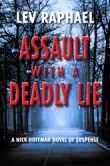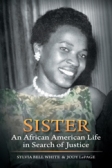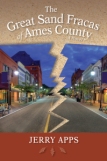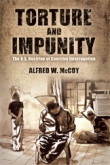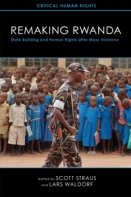Today kicks off the fourth annual University Press Week organized by the American Association of University Presses. The University of Wisconsin Press and more than f
orty other presses are participating in the AAUP’s annual blog tour during the week. This tour highlights the value of university presses and the contributions they make to scholarship and our society. This year’s theme is Surprising! so the blogs will highlight some of the surprising things university presses publish. Check the tour every day for new posts!
Mystery fiction from the University of Wisconsin Press is both a hit and a fit

James DeVita
James DeVita is Wisconsin’s preeminent stage actor, acclaimed this year by the Wall Street Journal as “the best classical actor in the United States today.” But DeVita jokes that he’s really a writer with an acting habit. A successful playwright and author of much-praised YA novels, DeVita published his first novel for adults this year, a gritty crime thriller set in Chicago and Wisconsin. The twist? A WINSOME MURDER stars a hard-bitten detective who finds insights in Shakespeare’s bloodiest plays.
“An engaging mystery that’s a feast of literary allusions. . . . [Detective James] Mangan’s ‘verbal quirks,’ snatches of prose or poetry that pop into his head and help him solve cases, make him an unusually distinctive sleuth.” —Publishers Weekly
This combination of regional settings and brainy themes epitomizes the successful range of mystery fiction that UWP has been publishing in recent years. DeVita hopes to spin his debut mystery into a series (in between acting stints at the Milwaukee Rep, American Players Theatre, and touring performances). Several other UWP authors are already on a roll with their own mystery series.
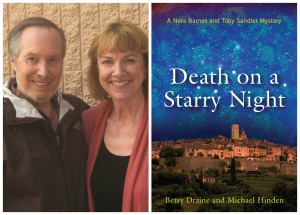
Michael Hinden and Betsy Draine
Summers spent in the Dordogne region of France inspired Betsy Draine and Michael Hinden, professors emeriti of English at the University of Wisconsin-Madison, to start their Nora Barnes and Toby Sandler Series. Like their sleuths, Draine and Hinden are a married couple who enjoy travel, art, and fine food and wine. After writing two nonfiction books about Dordogne, they collaborated on MURDER IN LASCAUX, sending their detective duo into the famous cave filled with Cro-Magnon paintings as well as into French castles, chateaus, and restaurants.
“A whodunit that nicely balances a breezily light travelogue with urgency and suspense. Readers will hope this is the first of a series,” wrote
Readers’ hopes were answered with a second book in the series, THE BODY IN BODEGA BAY, in which art historian Nora and antiques dealer Toby are at home in California, sorting out a criminal tangle of Russian art and Alfred Hitchcock memorabilia. And in Spring 2016, Nora and Toby will be back in the south of France with DEATH ON A STARRY NIGHT. French art, fine wine, romance, and murder mingle as academics squabble over how Vincent Van Gogh died.
Wisconsin’s most popular vacation destination is the setting for Patricia Skalka’s Dave Cubiak Door County Mysteries. Door County is the “Cape Cod of the Midwest,” a scenic peninsula jutting into Lake Michigan. Skalka, a former writer for Reader’s Digest and a native of Chicago, has mapped out plots for seven Dave Cubiak mysteries, inspired by time spent at her Door cottage over the years. 
In DEATH STALKS DOOR COUNTY, Skalka introduced Dave Cubiak, a morose homicide detective hoping to find solace in a new job as a park ranger. But there is no peace for Cubiak, as six deaths mar the holiday mood of summer vacationers. She followed up quickly with DEATH AT GILLS ROCK, in which newly elected Sheriff Cubiak follows an old trail of lies and betrayal.
“In her atmospheric, tightly written sequel, Skalka vividly captures the beauty of a remote Wisconsin peninsula that will attract readers of regional mysteries. Also recommended for fans of William Kent Krueger, Nevada Barr, and Mary Logue.”—Library Journal, *starred review

ASSAULT WITH A DEADLY LIE is the eighth installment in Lev Raphael’s series featuring English professor (and part-time sleuth) Nick Hoffman, set in a Michigan college town. Raphael draws on his experience as an Edith Wharton scholar, a prominent gay writer, and the son of Holocaust survivors to fashion a stunning and suspenseful tale of slander, prejudice, harassment, moral courage and cowardice, and the militarization of local police.

Lev Raphael
“It’s a terrifying thought: the idea that someone can accuse you of a crime, and a SWAT team shows up at your door and drags you away. . . . Raphael makes it quite clear that no one is immune.”—Mystery Scene

Jerry Apps
Popular Wisconsin writer Jerry Apps has produced six novels set in fictional Ames County, Wisconsin, some with mystery themes. His bestseller has been IN A PICKLE, in which the heavy-handed tactics of the H. H. Harlow Pickle Company are wreaking havoc with small farmers’ way of life.
“Apps utterly wins us over. . . . [He} invests the novel with the kind of realism, precise detail, and local color that only someone who had lived the story could do.”—Booklist


